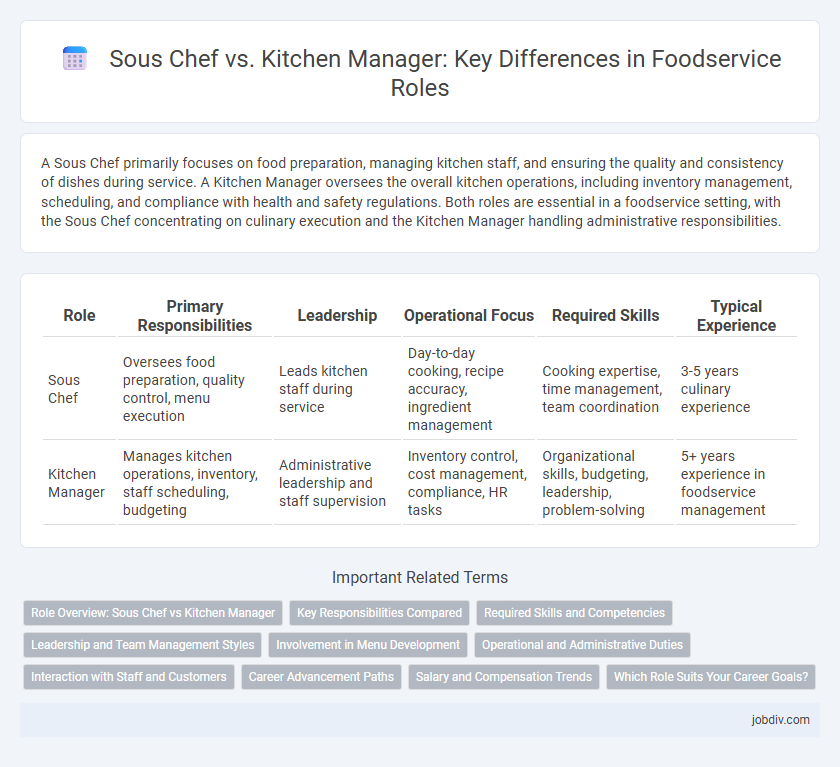A Sous Chef primarily focuses on food preparation, managing kitchen staff, and ensuring the quality and consistency of dishes during service. A Kitchen Manager oversees the overall kitchen operations, including inventory management, scheduling, and compliance with health and safety regulations. Both roles are essential in a foodservice setting, with the Sous Chef concentrating on culinary execution and the Kitchen Manager handling administrative responsibilities.
Table of Comparison
| Role | Primary Responsibilities | Leadership | Operational Focus | Required Skills | Typical Experience |
|---|---|---|---|---|---|
| Sous Chef | Oversees food preparation, quality control, menu execution | Leads kitchen staff during service | Day-to-day cooking, recipe accuracy, ingredient management | Cooking expertise, time management, team coordination | 3-5 years culinary experience |
| Kitchen Manager | Manages kitchen operations, inventory, staff scheduling, budgeting | Administrative leadership and staff supervision | Inventory control, cost management, compliance, HR tasks | Organizational skills, budgeting, leadership, problem-solving | 5+ years experience in foodservice management |
Role Overview: Sous Chef vs Kitchen Manager
A Sous Chef oversees daily kitchen operations, managing food preparation, staff coordination, and maintaining culinary standards to ensure high-quality meal production. A Kitchen Manager handles broader administrative responsibilities, including inventory control, budgeting, staff scheduling, and compliance with health and safety regulations. Both roles are crucial for efficient kitchen performance, but the Sous Chef focuses more on direct food production while the Kitchen Manager emphasizes operational management.
Key Responsibilities Compared
Sous Chefs primarily oversee daily kitchen operations, ensuring food quality, consistency, and staff coordination during service. Kitchen Managers handle broader responsibilities including inventory control, budgeting, staff scheduling, and compliance with health and safety regulations. Both roles require strong leadership, but the Sous Chef focuses more on culinary execution while the Kitchen Manager emphasizes operational management.
Required Skills and Competencies
Sous Chefs must demonstrate advanced culinary techniques, strong leadership in food preparation, and rapid problem-solving skills to maintain kitchen efficiency. Kitchen Managers require expertise in staff scheduling, inventory control, and compliance with health and safety regulations to ensure seamless restaurant operations. Both roles demand excellent communication, time management, and the ability to coordinate multiple tasks under high-pressure environments.
Leadership and Team Management Styles
The Sous Chef excels in hands-on leadership, directly overseeing kitchen operations and mentoring culinary staff with a focus on skill development and quality control. In contrast, the Kitchen Manager adopts a strategic leadership style, emphasizing operational efficiency, staff scheduling, and ensuring compliance with health regulations. Both roles require strong communication and decision-making skills but differ in their scope, with the Sous Chef more involved in day-to-day cooking processes and the Kitchen Manager concentrating on administrative and organizational tasks.
Involvement in Menu Development
Sous chefs actively contribute to menu development by collaborating closely with the head chef to create new dishes and refine recipes based on seasonal ingredients and customer preferences. Kitchen managers oversee the implementation of menu changes, ensuring that food preparation aligns with operational efficiency and cost control standards. Their role centers on balancing creative input with logistical execution to maintain kitchen productivity.
Operational and Administrative Duties
A Sous Chef primarily oversees daily kitchen operations, including food preparation, staff supervision, and ensuring quality control during service. In contrast, a Kitchen Manager focuses on administrative duties such as inventory management, budgeting, scheduling, and compliance with health and safety regulations. Both roles require strong leadership but differ in operational execution versus strategic administration within foodservice establishments.
Interaction with Staff and Customers
Sous chefs maintain direct communication with kitchen staff to oversee meal preparation and ensure quality, fostering teamwork and efficiency during service. Kitchen managers interact with both staff and customers, addressing operational issues and customer feedback to enhance overall dining experience. Effective collaboration between sous chefs and kitchen managers is essential for seamless kitchen operations and positive customer relations.
Career Advancement Paths
Sous Chefs often advance by honing culinary techniques and leadership skills in high-pressure kitchens, preparing them for executive chef roles focused on menu innovation and food quality. Kitchen Managers typically progress by mastering operational management, inventory control, and staff coordination, advancing toward roles like Foodservice Director or Hospitality Manager. Both paths require expertise in team leadership and kitchen operations but diverge in focus between culinary excellence and business management within the foodservice industry.
Salary and Compensation Trends
Sous chefs typically earn between $40,000 and $60,000 annually, reflecting their hands-on culinary responsibilities in busy kitchens. Kitchen managers command higher salaries, often ranging from $50,000 to $75,000, owing to their broader role in overseeing kitchen operations and staff management. Recent compensation trends show an increase in bonuses and benefits for kitchen managers, aligning with the growing emphasis on leadership and operational efficiency in foodservice establishments.
Which Role Suits Your Career Goals?
Choosing between a sous chef and kitchen manager depends on your career aspirations within foodservice. A sous chef emphasizes culinary creativity, food preparation, and staff supervision, ideal for those aiming to master culinary skills and advance toward executive chef roles. Kitchen managers focus on operational efficiency, inventory control, and staff scheduling, suiting individuals interested in restaurant management and overall kitchen administration.
Sous Chef vs Kitchen Manager Infographic

 jobdiv.com
jobdiv.com